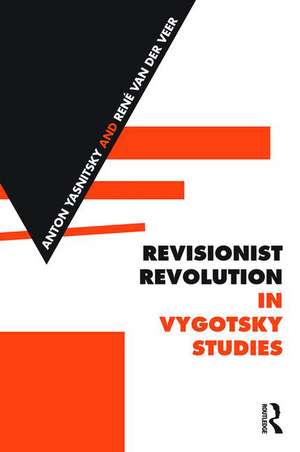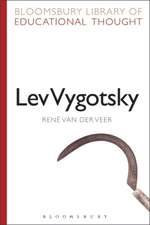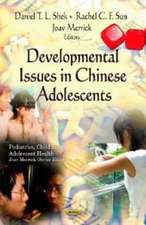Revisionist Revolution in Vygotsky Studies: The State of the Art
Editat de Anton Yasnitsky, René Van der Veeren Limba Engleză Paperback – 28 noi 2017
- The chronology of Vygotsky’s ideas and theory development, and the main core of his theoretical writings
- Relationships between Vygotskians and their Western colleagues
- The international reception of Vygotskian psychology and problems of translation
- The future development of Vygotskian science
This volume is the first to provide an overview of revisionist studies of Vygotsky’s work, and is the product of close international collaboration between revisionist scholars. It will be an essential contribution to Vygotskian scholarship, and of great interest to researchers in the history of psychology, history of science, Soviet/Russian history, philosophical psychology and philosophy of science.
| Toate formatele și edițiile | Preț | Express |
|---|---|---|
| Paperback (1) | 449.41 lei 43-57 zile | |
| Taylor & Francis – 28 noi 2017 | 449.41 lei 43-57 zile | |
| Hardback (1) | 1169.16 lei 43-57 zile | |
| Taylor & Francis – 22 sep 2015 | 1169.16 lei 43-57 zile |
Preț: 449.41 lei
Nou
Puncte Express: 674
Preț estimativ în valută:
85.99€ • 90.03$ • 71.15£
85.99€ • 90.03$ • 71.15£
Carte tipărită la comandă
Livrare economică 07-21 aprilie
Preluare comenzi: 021 569.72.76
Specificații
ISBN-13: 9781138929692
ISBN-10: 1138929697
Pagini: 334
Ilustrații: 18 Tables, black and white
Dimensiuni: 156 x 234 x 22 mm
Greutate: 0.45 kg
Ediția:1
Editura: Taylor & Francis
Colecția Routledge
Locul publicării:Oxford, United Kingdom
ISBN-10: 1138929697
Pagini: 334
Ilustrații: 18 Tables, black and white
Dimensiuni: 156 x 234 x 22 mm
Greutate: 0.45 kg
Ediția:1
Editura: Taylor & Francis
Colecția Routledge
Locul publicării:Oxford, United Kingdom
Cuprins
Foreward, Alex Kozulin PART I. Contexts and People 1. The archetype of Soviet psychology: From Stalinism of the 1930s to the "Stalinist science" of our days, Anton Yasnitsky 2. Unity in diversity: Vygotsky-Luria Circle as an informal personal network of scholars, Anton Yasnitsky 3. Deconstructing Vygotsky’s Victimization Narrative: A Re-Examination of the "Stalinist Suppression" of Vygotskian Theory, Jennifer Fraser and Anton Yasnitsky PART II. Texts and Legacy 4. Vygotsky the Published: Who wrote Vygotsky and what Vygotsky actually wrote, René van der Veer & Anton Yasnitsky 5. Vygotsky the Unpublished: An Overview of Personal Archive (1912—1934), Ekaterina Zavershneva 6. "The way to freedom": Vygotsky in 1932, Ekaterina Zavershneva PART III. Holism and Transnationalism 7. Translating Vygotsky: Some problems of transnational Vygotskian science, René van der Veer and Anton Yasnitsky 8. Did Uzbeks have illusions? The Luria—Koffka controversy of 1932, Eli Lamdan and Anton Yasnitsky 9. A Transnational History of The Beginning of a Beautiful Friendship: The birth of cultural-historical gestalt psychology of Alexander Luria, Kurt Lewin, Lev Vygotsky, and Others, Anton Yasnitsky EPILOGUE 10. "Lost in translation": Talking about sense, meaning, and consciousness, Anton Yasnitsky & René van der Veer APPENDIX Appendix A. Bibliography of Vygotsky’s Published Works Appendix B. Vygotsky’s and Soviet Pedological Publications in 1924-1936 Appendix C. Vygotsky-Luria Circle: Key Protagonists
Recenzii
‘An indispensable volume for the intellectual project of coming to terms with Vygotsky’s theory and adapting it to current problems in new contexts’. – Peter Smagorinsky, The University of Georgia, USA
‘Lev Vygotsky is one of those titans of psychology who have been grossly and unfairly misperceived. A subtly cultural and deeply politicized author, Vygotsky creatively combined Freudian and Trotskyite, developmental and linguist influences. This book gives a thorough revision of Vygotsky’s heritage, which is indispensable for everyone who reads and follows Vygotsky the psychologist’. - Alexander Etkind, European University at Florence, Italy
‘Yasnitsky and van der Veer offer a sharp polemic with ‘cultism’ in Vygotsky Studies, rooting their revisionist arguments in an original historical reconstruction and deconstruction of the Vygotskian legacy in the Soviet Union, post-Soviet Russia and the wider world. This collection of studies sheds new light on the history of the reception and promotion of Vygotsky and his ‘school’’. - Andy Byford, Durham University, UK
‘Lev Vygotsky is one of those titans of psychology who have been grossly and unfairly misperceived. A subtly cultural and deeply politicized author, Vygotsky creatively combined Freudian and Trotskyite, developmental and linguist influences. This book gives a thorough revision of Vygotsky’s heritage, which is indispensable for everyone who reads and follows Vygotsky the psychologist’. - Alexander Etkind, European University at Florence, Italy
‘An indispensable volume for the intellectual project of coming to terms with Vygotsky’s theory and adapting it to current problems in new contexts’. – Peter Smagorinsky, The University of Georgia, USA
‘Yasnitsky and van der Veer offer a sharp polemic with ‘cultism’ in Vygotsky Studies, rooting their revisionist arguments in an original historical reconstruction and deconstruction of the Vygotskian legacy in the Soviet Union, post-Soviet Russia and the wider world. This collection of studies sheds new light on the history of the reception and promotion of Vygotsky and his ‘school’’. - Andy Byford, Durham University, UK
"For such a complex topic, the work is surprisingly accessible, making use of clear prose and useful tables and figures to examine the topic. A marvelous complement to Vygotsky’s Mind in Society or Thought and Language or secondary works, such as Luis Moll’s L. S. Vygotsky and Education."
--S. T. Schroth, Towson University,CHOICE, Vol. 54 No. 2
‘Lev Vygotsky is one of those titans of psychology who have been grossly and unfairly misperceived. A subtly cultural and deeply politicized author, Vygotsky creatively combined Freudian and Trotskyite, developmental and linguist influences. This book gives a thorough revision of Vygotsky’s heritage, which is indispensable for everyone who reads and follows Vygotsky the psychologist’. - Alexander Etkind, European University at Florence, Italy
‘Yasnitsky and van der Veer offer a sharp polemic with ‘cultism’ in Vygotsky Studies, rooting their revisionist arguments in an original historical reconstruction and deconstruction of the Vygotskian legacy in the Soviet Union, post-Soviet Russia and the wider world. This collection of studies sheds new light on the history of the reception and promotion of Vygotsky and his ‘school’’. - Andy Byford, Durham University, UK
‘Lev Vygotsky is one of those titans of psychology who have been grossly and unfairly misperceived. A subtly cultural and deeply politicized author, Vygotsky creatively combined Freudian and Trotskyite, developmental and linguist influences. This book gives a thorough revision of Vygotsky’s heritage, which is indispensable for everyone who reads and follows Vygotsky the psychologist’. - Alexander Etkind, European University at Florence, Italy
‘An indispensable volume for the intellectual project of coming to terms with Vygotsky’s theory and adapting it to current problems in new contexts’. – Peter Smagorinsky, The University of Georgia, USA
‘Yasnitsky and van der Veer offer a sharp polemic with ‘cultism’ in Vygotsky Studies, rooting their revisionist arguments in an original historical reconstruction and deconstruction of the Vygotskian legacy in the Soviet Union, post-Soviet Russia and the wider world. This collection of studies sheds new light on the history of the reception and promotion of Vygotsky and his ‘school’’. - Andy Byford, Durham University, UK
"For such a complex topic, the work is surprisingly accessible, making use of clear prose and useful tables and figures to examine the topic. A marvelous complement to Vygotsky’s Mind in Society or Thought and Language or secondary works, such as Luis Moll’s L. S. Vygotsky and Education."
--S. T. Schroth, Towson University,CHOICE, Vol. 54 No. 2
Descriere
Revisionist Revolution in Vygotsky Studies offers a critical re-evaluation of Vygotsky’s theory of learning and human development. International researchers examine both critical and constructive aspects of the ‘revisionist’ movement and discuss new material derived from previously unpublished material in Vygotsky’s archive. The book will be an essential contribution to Vygotskian scholarship and of interest to researchers in history of psychology, history of science, Soviet/Russian history, philosophical psychology and philosophy of science.










